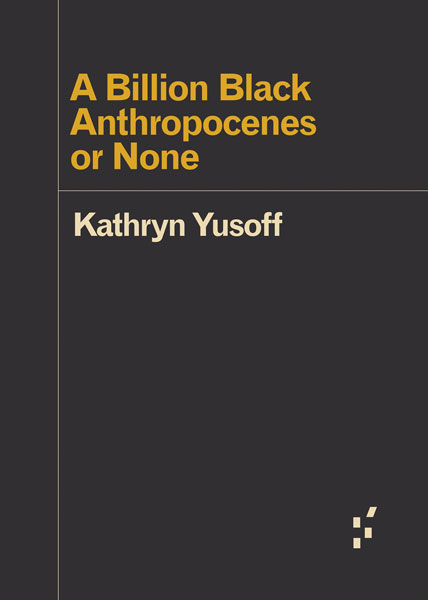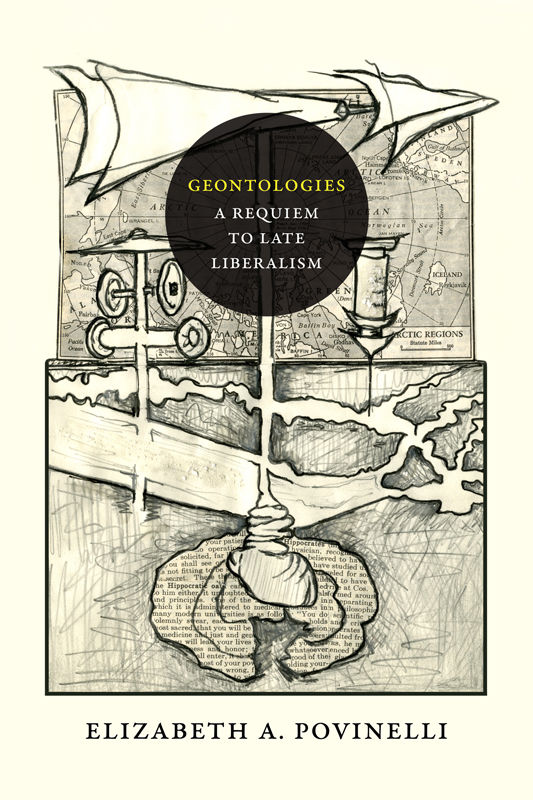Kathryn Yusoff: A Billion Black Anthropocenes or None (2018)
Filed under book | Tags: · anthropocene, black people, blackness, colonialism, critique, earth, earth system, geology, materiality, politics, race, slavery, theory

“No geology is neutral, writes Kathryn Yusoff. Tracing the color line of the Anthropocene, A Billion Black Anthropocenes or None examines how the grammar of geology is foundational to establishing the extractive economies of subjective life and the earth under colonialism and slavery. Yusoff initiates a transdisciplinary conversation between black feminist theory, geography, and the earth sciences, addressing the politics of the Anthropocene within the context of race, materiality, deep time, and the afterlives of geology.”
Publisher University of Minnesota Press, 2018
Forerunners series
ISBN 9781517907532, 1517907535
xiv+115 pages
Commentary: McKenzie Wark (Verso Blog, 2019).
Comment (0)Elizabeth A. Povinelli: Geontologies: A Requiem to Late Liberalism (2016)
Filed under book | Tags: · anthropocene, assemblage, being, biopolitics, capital, difference, ethnology, geology, geontopower, governance, indigenous peoples, liberalism, life, ontology, power

“In Geontologies Elizabeth A. Povinelli continues her project of mapping the current conditions of late liberalism by offering a bold retheorization of power. Finding Foucauldian biopolitics unable to adequately reveal contemporary mechanisms of power and governance, Povinelli describes a mode of power she calls geontopower, which operates through the regulation of the distinction between Life and Nonlife and the figures of the Desert, the Animist, and the Virus. Geontologies examines this formation of power from the perspective of Indigenous Australian maneuvers against the settler state. And it probes how our contemporary critical languages—anthropogenic climate change, plasticity, new materialism, antinormativity—often unwittingly transform their struggles against geontopower into a deeper entwinement within it. A woman who became a river, a snakelike entity who spawns the fog, plesiosaurus fossils and vast networks of rock weirs: in asking how these different forms of existence refuse incorporation into the vocabularies of Western theory Povinelli provides a revelatory new way to understand a form of power long self-evident in certain regimes of settler late liberalism but now becoming visible much further beyond.”
Publisher Duke University Press, 2016
ISBN 9780822362111, 0822362112
xii+218 pages
Interview with author: Mathew Coleman and Kathryn Yusoff (Theory, Culture & Society, 2017).
Reviews: Shela Sheikh (Avery Review, 2017), Robin Wright (Society+Space, 2017), Eve Vincent (Australian Aboriginal Studies, 2017), Timothy Neale (Australian Journal of Anthropology, 2017), Andrea Muehlebach (Anthropological Quarterly, 2018), Jean-Thomas Tremblay (Critical Inquiry, 2018), Elizabeth R Johnson, Garnet Kindervater, Zoe Todd, Kathryn Yusoff, Keith Woodward (with author’s response, EPC: Politics and Space, 2019).
Comment (0)The Anthropocene Review, 2(2): When and How Did the Anthropocene Begin? (2015)
Filed under journal | Tags: · anthropocene, climate crisis, earth, environment, geology, human, science

“In March of this year, Nature published a stimulating article by Simon Lewis and Mark Maslin entitled Defining the Anthropocene (Lewis and Maslin, 2015). In it, they proposed criteria for determining the formal onset of the Anthropocene Epoch and from these, derived new starting dates. They proposed two alternatives, ad 1610 and ad 1964. The former date lies some two centuries before the date proposed by Crutzen and Stoermer (2000) in their paper introducing and providing both a definition and a starting point for the Anthropocene. The latter date is over a decade later than an alternative and increasingly discussed onset date arising from Steffen et al.’s paper (2007) identifying a ‘Great Acceleration’ in detectable human impact on the Earth System beginning in the mid 20th century. These new proposals have provoked a great deal of interest and debate.
In this issue of The Anthropocene Review, we have tried to provide a timely account of this debate. The first four papers comprise contrasted ‘comments’ on the Nature article, followed by ‘replies’ from its authors. The issues raised are far from forming a sterile debate on starting dates. They are full of, and indeed go well beyond, the engaging scientific basis upon which the contrasted points of view rest.” (from the Editorial)
Editor: Mike Oldfield
Publisher Sage, August 2015
ISSN 20530196
91 pages
PDF (2 MB)
Comment (0)
